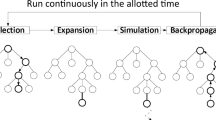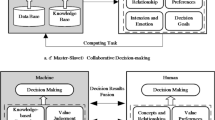Abstract
We present a multi-dimensional, multi-step negotiation mechanism for task allocation among cooperative agents based on distributed search. This mechanism uses marginal utility gain and marginal utility cost to structure this search process, so as to find a solution that maximizes the agents’ combined utility. These two utility values together with temporal constraints summarize the agents’ local information and reduce the communication load. This mechanism is anytime in character: by investing more time, the agents increase the likelihood of getting a better solution. We also introduce a multiple attribute utility function into negotiations. This allows agents to negotiate over the multiple attributes of the commitment, which produces more options, making it more likely for agents to find a solution that increases the global utility. A set of protocols are constructed and the experimental result shows a phase transition phenomenon as the complexity of negotiation situation changes. A measure of negotiation complexity is developed that can be used by an agent to choose an appropriate protocol, allowing the agents to explicitly balance the gain from the negotiation and the resource usage of the negotiation.
Similar content being viewed by others
References
H. J. Mu¨ ller, “Negotiation principles,” in G.M.P. O’Hare and N. R. Jennings (eds.), Foundations of Distributed Artificial Intelligence, Wiley Interscience: New York, NY, 1996.
T. W. Sandholm, “Distributed rational decision making,” in Multiagent System, 1999.
P. Cheeseman, B. Kanefsky, and W. M. Taylor, “Where the really hard problems are,” in Proceedings of IJCAI-91.
M. Chia, D. Neiman, and V. Lesser, “Coordinating asynchronous agent activities in a distributed scheduling system,” in Proceedings of the Second International Conference on Autonomous Agents (Agents98), 1998.
K. S. Decker and V. R. Lesser, “Quantitative modeling of complex environments,” Int. J. Intell. Syst. Account. Fiance Manage. vol. 2, no.4, pp. 215–234, 1993.
J. J. Talavage, A. V. Deshmukh, and M. M. Barash, “Complexity in manufacturing systems; Part 1–analysis of static complexity,” IIE Trans., vol. 30, no.7, pp. 645–655, 1998.
H. Laasri, S. Lander, B. Laasri, and V. Lesser, “A generic model for intelligent negotiating agents,” Int. J. Intell. Coop. Inform. Syst., vol. 1, no.2, pp. 291–317, 1992.
S. Lander and V. Lesser, “Sharing meta-information to guide cooperative search among heterogeneous reusable agents,” IEEE Trans. Knowl. Data Eng., vol. 9, no.2, pp. 193–208, 1997.
T. Moehlman, V. Lesser, and B. Buteau, “Decentralized negotiation: An approach to the distributed planning problem,” in K. Sycara (ed.), Group Decision and Negotiation, Kluwer Academic Publishers, vol. 1, 1992, pp. 161–192.
T. Sandholm and V. Lesser, “Issues in automated negotiation and electronic commerece: Extending the contract net framework,” in Proceedings of the First International Conference on Multi-Agent System(ICMAS95), 1995.
O. Shehory and S. Kraus, “Methods for task allocation via agent coalition formation,” Art. Intell., vol. 101, no.1–2, pp. 165–200, 1998.
T. Wagner, A. Garvey, and V. Lesser, “Criteria-Directed Heuristic Task Scheduling,” Int. J. Approx. Resor., Special Issue on Scheduling, vol. 19, no.1–2, pp. 91–118, 1998.
X. Zhang, R. Podorozhny, and V. Lesser, “Cooperative, multistep negotiation over a multi-dimensional utility function multi-agent systems negotiation,” in Proceedings of the IASTED International Conference, Artificial Intelligence and Soft Computing (ASC), 2000.
Author information
Authors and Affiliations
Rights and permissions
About this article
Cite this article
Zhang, X., Lesser, V. & Podorozhny, R. Multi-Dimensional, MultiStep Negotiation. Auton Agent Multi-Agent Syst 10, 5–40 (2005). https://doi.org/10.1007/s10458-004-5020-3
Issue Date:
DOI: https://doi.org/10.1007/s10458-004-5020-3




